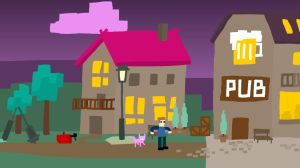 Moon Waltz is a very short game, but it’s one you’re going to want to play multiple times. A lot can happen as the man takes his walk and you’ll likely want to experiment a bit.
Moon Waltz is a very short game, but it’s one you’re going to want to play multiple times. A lot can happen as the man takes his walk and you’ll likely want to experiment a bit.
Category: Free
Hanna in a Choppa does the venerable cave flier genre proud
There’s a genre of games called “cave fliers” which don’t get a lot of love anymore. You see one now and then, and smartphones have gotten them a little attention again, but they’re not exactly well-represented. In a way this isn’t surprising, cave fliers are characterized by taking something simple, movement, and making it difficult. People can get frustrated when all they’re trying to do is get from here to there and they can’t even manage that much.
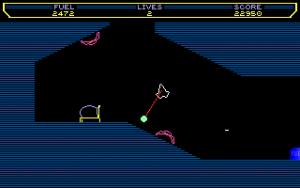 Cave fliers are games consisting of moving against gravity, almost always through enclosed spaces and usually by means of a single propulsion mechanism which has to be aimed in order to direct your motion. The most common way this is implemented is something along the lines of Asteroids – you can fire your rocket to move forward, wherever you’re pointed, and you can also rotate, and that’s it. Those are your movement controls. The difficulty is mostly about the strength of gravity and your rocket, and how forgiving the ground is when you run into it. There are often enemies and some element of combat, but that’s not usually the focus. Frequently, just to make to make things harder, there’s also cargo involved – something heavy to be awkwardly transported.
Cave fliers are games consisting of moving against gravity, almost always through enclosed spaces and usually by means of a single propulsion mechanism which has to be aimed in order to direct your motion. The most common way this is implemented is something along the lines of Asteroids – you can fire your rocket to move forward, wherever you’re pointed, and you can also rotate, and that’s it. Those are your movement controls. The difficulty is mostly about the strength of gravity and your rocket, and how forgiving the ground is when you run into it. There are often enemies and some element of combat, but that’s not usually the focus. Frequently, just to make to make things harder, there’s also cargo involved – something heavy to be awkwardly transported.
It’s a quirky genre but there are a bunch of recognizable examples, it’s just that almost all of them are 15+ years old: Thrust, Solar Jetman, Sub-Terrania… Lander was a 3D cave flier released in 1999 where you controlled two rotational axis with your mouse instead of just one. That was a good one. Flappy Bird could also be described as a greatly simplified cave flier, though it isn’t the most flattering example.
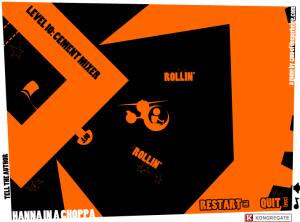 Hanna in a Choppa is a flash game from 2008 which takes the old model and does away with a lot of the difficulty, while adding some humor and a whole lot of orange. In some respects it could be described as a little dumbed-down, most of what makes it easier is a control scheme that operates in world space: from the perspective of the player rather than from the perspective of the player-character. So up always means up, no matter which direction the PC is facing. This doesn’t make physical sense, but it does make for a light and enjoyable game. The developer agonized a bit over this decision, and wrote an article describing the design process here.
Hanna in a Choppa is a flash game from 2008 which takes the old model and does away with a lot of the difficulty, while adding some humor and a whole lot of orange. In some respects it could be described as a little dumbed-down, most of what makes it easier is a control scheme that operates in world space: from the perspective of the player rather than from the perspective of the player-character. So up always means up, no matter which direction the PC is facing. This doesn’t make physical sense, but it does make for a light and enjoyable game. The developer agonized a bit over this decision, and wrote an article describing the design process here.
Good news! The classic cave flier control scheme is still available in the options, though it uses a mouse for rotation rather than the more typical keys. That… seems like a mistake for a flash title which takes place in a small box within a browser, but at least it’s there for the hardcore cave flier aficionados. I don’t recommend it.
In 2012 there was a sequel, Hanna in a Choppa 2, which added a bunch of non-choppa vehicles. For some reason this is named “Tunnel Pilot” on addictinggames.com, who sponsored its development.
1Quest finds a way to allow for partial success in a roguelike
1Quest is a short roguelike that seems to have gone unappreciated. It’s one of my favorite examples of this style done well, but player reviews in the places I’ve checked seem to be really harsh. I can’t understand it. The game really delivers the roguelike experience to a greater degree than I expect in something of this scope, with an involved skills and magic system, a good variety of loot, and the facilitation of the kind of environmental survival techniques that I expect in every roguelike but don’t always see – by that I mean the ability, and often necessity, to use traps and water and other environmental features to your advantage.
It’s difficult, but difficulty is a necessary part of the roguelike experience. In fact, 1Quest has a clever innovation in this respect: the princess and eight other children have been captured and your quest is to rescue them. Ideally all of them, but some is better than none. Unlike most rogulikes, failure doesn’t mean death for you but rather death for one of the children. How’s that for motivation? It allows you to keep going, it means you don’t lose everything when you make a mistake, but there’s a pretty strong incentive to try again until you get it right. There are also multiple paths to take on your journey, changing it up a little to keep things interesting, multiple spell schools which are (sort of) mutually exclusive and multiple weapons skills, all to ensure there’s some variety from game to game.
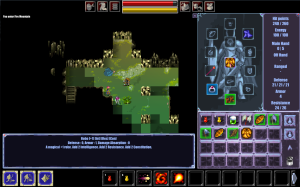 As you’d anticipate from a flash game, it’s short compared to the big names of the genre, Nethack, ADOM, etc., though roguelikes are unusual in that it’s free games which are the big headliner titles. Commercial roguelikes are always smaller in scope. Compared to its peers though, 1Quest really delivers a lot which will be familiar to roguelike veterans – managing to fit just about everything that you’d expect from a roguelike into its small package. (Seriously, a lot of these games don’t even let you move diagonally. It’s annoying.)
As you’d anticipate from a flash game, it’s short compared to the big names of the genre, Nethack, ADOM, etc., though roguelikes are unusual in that it’s free games which are the big headliner titles. Commercial roguelikes are always smaller in scope. Compared to its peers though, 1Quest really delivers a lot which will be familiar to roguelike veterans – managing to fit just about everything that you’d expect from a roguelike into its small package. (Seriously, a lot of these games don’t even let you move diagonally. It’s annoying.)
There’s several versions of this available: a free online version, another commercial version available from several sources (that’s three links), and a commercial Android version. As near as I can tell there aren’t any differences between the free version and the commercial one, though I will point out two things: flash cookies are an awful way to store data, so if you find yourself playing this a lot you might consider paying some money just to ensure that your records and saves don’t disappear. Second, it’s not a lot of money and this person hasn’t gotten either the praise or the livelihood that they deserved from this game.
Finally, I’m going to link to the dev’s blog, just because it seems polite. Maybe you all love the game so much that you want to keep abreast of anything new that the dev might be up to.
Vector Racer is a turn-based racing game
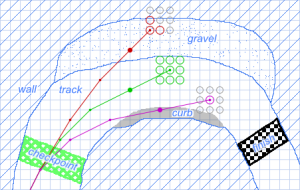 Vector Racer is a turn-based racing game. Think about that for a minute, consider how it plays out… you’re probably wrong. But only because there are so many ways to do turn-based racing, I think this is a genre ripe for innovation. I’m thinking about making a turn-based racing game right now. In fact, I’m going to put that on my to-do list: “Make a turn-based racing game.” Check.
Vector Racer is a turn-based racing game. Think about that for a minute, consider how it plays out… you’re probably wrong. But only because there are so many ways to do turn-based racing, I think this is a genre ripe for innovation. I’m thinking about making a turn-based racing game right now. In fact, I’m going to put that on my to-do list: “Make a turn-based racing game.” Check.
The Fall of Mr. Wily – a very short origin story
 The Fall of Mr. Wily is an origin story told in the way that, frankly, most origin stories should be told: quickly and efficiently.
The Fall of Mr. Wily is an origin story told in the way that, frankly, most origin stories should be told: quickly and efficiently.
I love games like this, which manage to do a lot without requiring much time from the player. There are much worse ways to spend five minutes. In fact, it’s likely that’s exactly what you’re doing right now.
Elements – an online collectible card game
Youngsters don’t believe me when I say this, but there was a time when “collectible card game” wasn’t just jargon for “excuse to charge you real money for virtual cards.” I still think fondly of Etherlords 2, but that game is eleven years old now and it’s still the most recent video game from a major publisher to even try to do a CCG right (for my definition of right).
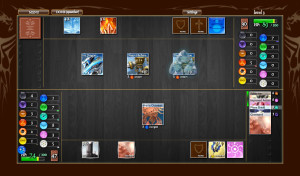 There have been a few attempts from indies to do CCGs well. Not many, but a few. Elements is one of those and there’s a lot to like here – the game plays uniquely enough, I can’t think of any card games with a similar rule set, and there are a large number of cards which combo in ways which aren’t always immediately obvious.
There have been a few attempts from indies to do CCGs well. Not many, but a few. Elements is one of those and there’s a lot to like here – the game plays uniquely enough, I can’t think of any card games with a similar rule set, and there are a large number of cards which combo in ways which aren’t always immediately obvious.
I’m going to do good/bad bullet points:
- Good: still active community, now four years after the game launched
- Bad: inactive developer. Game development seems to have stopped entirely.
- Good: large variety of cards with powers which interact in many interesting ways
- Bad: getting all the cards you want to make interesting decks gets pretty grindy
- Good: even the grinding is fun, at first – the low power cards still manage to be interesting
- Bad: not forever
- Good: there are some quests to give you some objectives and get you started
- Bad: not many quests. And once they’re done continuing to play is entirely motivated by card collecting, nothing else.
Despite all the downsides, I’ve played the crap out of this game. I highly recommend that you play it for a while. And then stop.